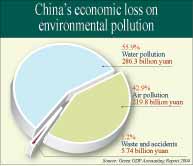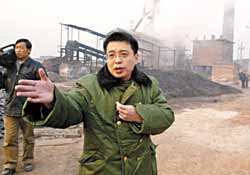Green GDP to be expanded nationally
By Sun Xiaohua (China Daily)Updated: 2007-01-18 07:16
'Pollute, then treat' is not the right
model
Editor's Note: Pan Yue, vice-minister of the State
Environmental Protection Administration (SEPA), has been in the media limelight
for the so-called environmental protection "storm" his administration launched
in 2005 to curb the country's widespread pollution. An ardent advocate of Green
GDP, Pan has been pushing hard for the program amid resistance from some local
government leaders, who fear more rigid environmental protection measures will
hinder local economic growth. In an interview with China Daily, Pan tells of the
ambitions of his administration and himself: to build a clean, green China.
Q: It is believed that China could not avoid the practice of "polluting first, then treating it" as experienced by some developed countries. What's your comment on this?
A: It might be true that some of these countries could first develop their economy and then begin to engage in environment protection. But China really cannot afford such a model.
Firstly, when China started its industrialization and modernization drive in the late 20th century, the developed Western countries had already completed their primitive capital accumulation and established a series of international rules in their favor. Under such circumstances, it is impossible for China to transfer its cost of pollution to the rest of the world.
Secondly, the population-environment structure in China is different, so we cannot blindly copy the Western model to pay attention to environment issues only after the country has achieved a per capita GDP of $8,000. China may already be facing a severe environment situation when its per capita GDP reaches $2,000. Economic crisis can be resolved through macro-control, but an ecological crisis will inevitably lead a country to disaster.
Thirdly, China has taken the road of socialism, and the traditional Chinese culture is a culture of harmony. That means China will never practice any form of eco-colonialism. The only correct path for us is to pursue a sustainable development, namely a path of peaceful and environment-friendly development.
Q: Did the SEPA seek international experience and cooperation in China's Green GDP calculation?
A: In China's Green GDP calculation, we have tried to ensure consistency in concepts, definitions and classifications of its indicators with the System for Integrated Environmental and Economic Accounting (SEEA), which is promoted by the UN Statistics Division.
 At the same time, we have worked closely with the
international community.
At the same time, we have worked closely with the
international community.
The World Bank set up a special technical support program to help research the Green GDP accounting, which was concluded last month. We also received encouragement and support during our work from the UN Statistics Division, the United Nations Environment Programme, the European Union, Canada, Norway and the Netherlands.
Q: The SEPA last Thursday named 82 projects with a total investment of 112.3 billion yuan ($14.44 billion) that failed to pass environment appraisal and suspended appraisals for all the new projects in four cities, and for four of the country's major power groups. The media described the move as another "environmental protection storm". What do you think?
A: No matter what it is labeled, my judgment criteria is that: if each time we can solve new problems and help set up new systems, then it is of significance.
If it cannot solve a problem or establish a system merely to serve the whims of the media, then it is meaningless and will be soon forgotten.
Two years ago, the SEPA issued an interim regulation on public participation in environment appraisal. A regulation on environment appraisal was also submitted to the Office of Legislative Affairs of the State Council.
These regulations, together with our ongoing move to stop environment appraisal of a whole region for a single violation, and a regulation under discussion to open environment information to the public, are all part of our constant efforts to create a new and better mechanism and system.
Q: By calling a halt to projects that violate environment appraisal rules, the SEPA has substantially affected the economic interests of local governments. How will you overcome local resistance?
A: At present, driven by local and industrial interests, the situation of illegal construction and operation is getting worse. It has severely disrupted the country's macro-control and industrial structure and put mounting pressure on the environment and resources.
The mild environment management and legal measures we once used in the past have proved to be ineffective. Therefore, we have to explore new ways of management.
The policy to stop environment appraisal of a whole region or whole industrial group for a single violation is a major innovative way of enhancing the administrative powers of the environmental protection authorities.
Q: The SEPA has constantly promoted the inclusion of environmental protection achievements in the official performance evaluation system, do you think it can effectively prod local officials to pay more attention to environmental protection?
A: The move is very necessary. But a scientific objective and appraisal system should be set up first.
Like the Green GDP calculation system, a strict rewards and punishment system and accountability should be adopted to ensure governments at all levels will implement it.
We will do what we can to speed up the legislative process of a detailed regulation to evaluate the environmental protection performance of officials and make it an important reference for their promotion or appointment.
Only by doing this can we change the officials' "economy-overriding-all" perspective and to one of low energy consumption, high utilization and low emission.
Q: Are you confident that the country will meet its pollution control target?
A: The central government has made it compulsory to cut discharge of major pollutants by 10 percent for the country's economic and social development in the 11th Five-Year Program period. The solemn commitment indicates the central authorities had considered environmental protection strategically important to the country's long-term growth and to the interests of the people.
The SEPA has signed responsibility contracts with provincial governments and six State power groups, including the China Huaneng Group, to reduce the discharge of pollutants. The SEPA has also released guidelines on the allowance quotas of wastewater discharge and sulphur dioxide emissions.
Q: Some media reports claim you have been promoted the first vice-minister of the SEPA. Is it true?
A: I'm now a vice-minister because two SEPA vice-ministers have just retired, so you can't say I was promoted. However, promoted or not, it doesn't matter so long as I can work for the country and the people.
 | 1 | 2 |
|
||
|
||
|
|

